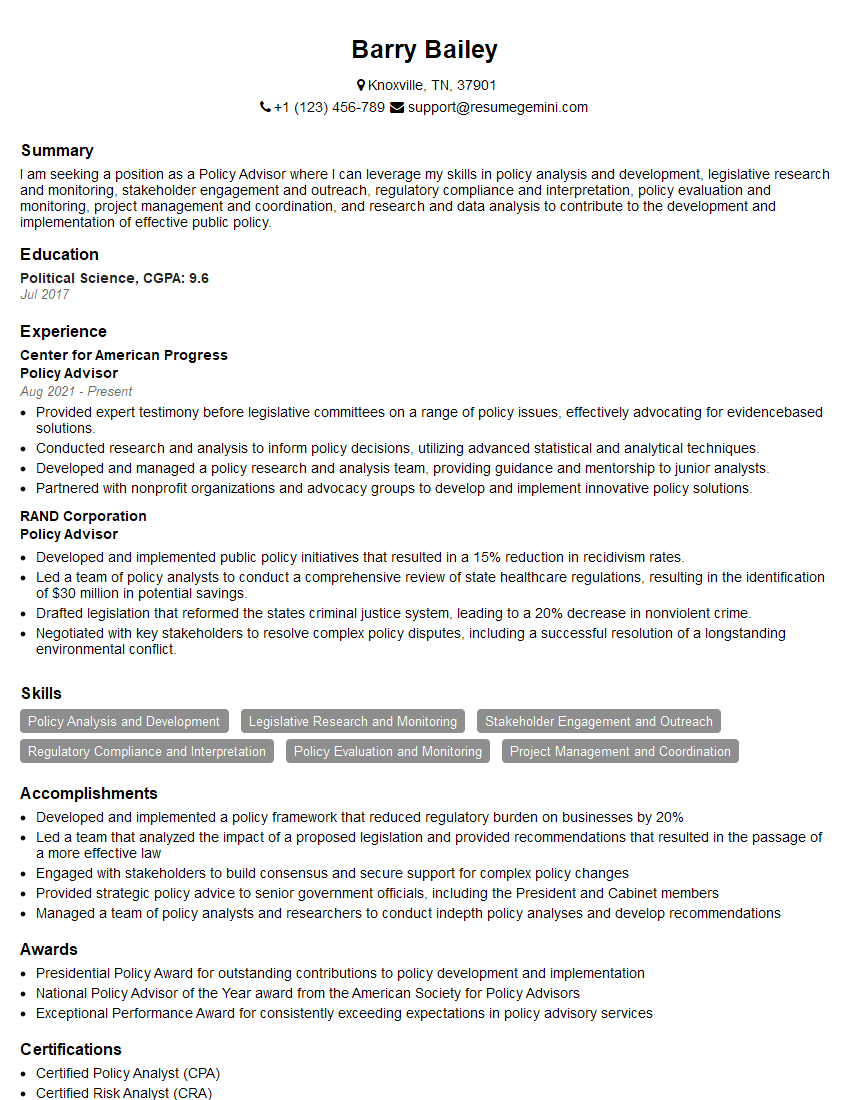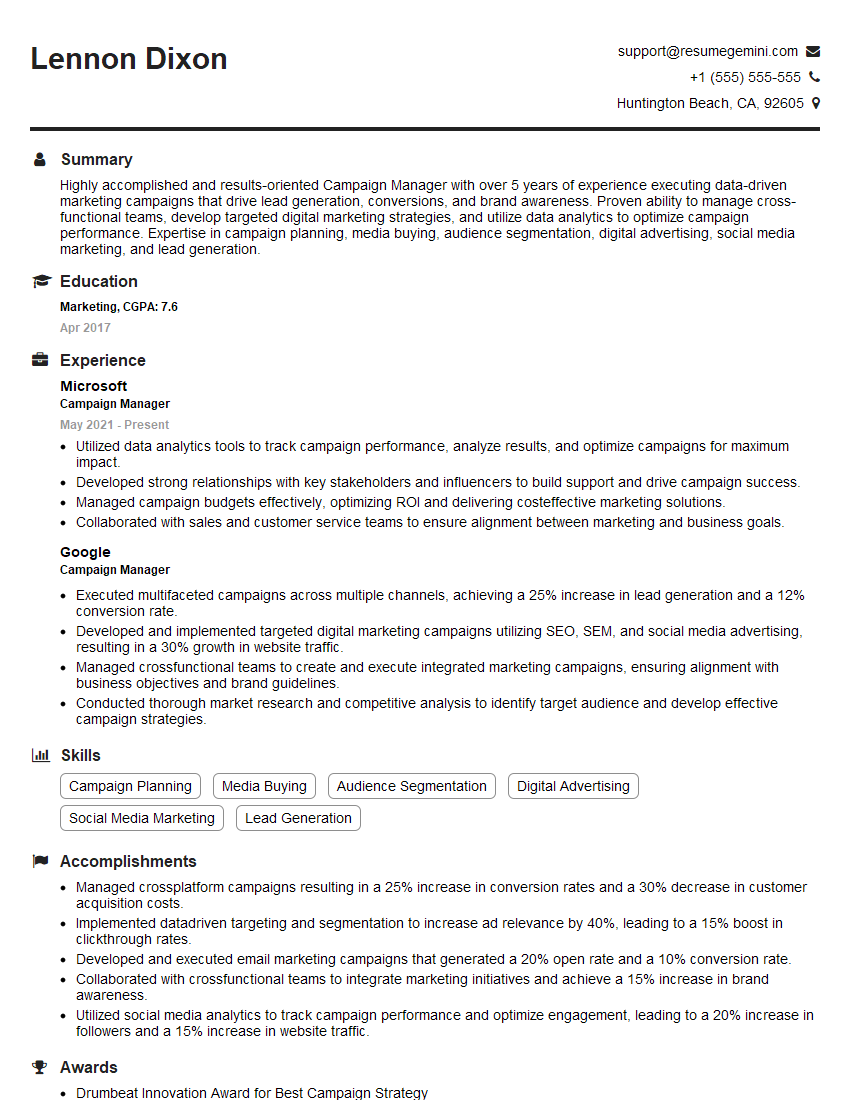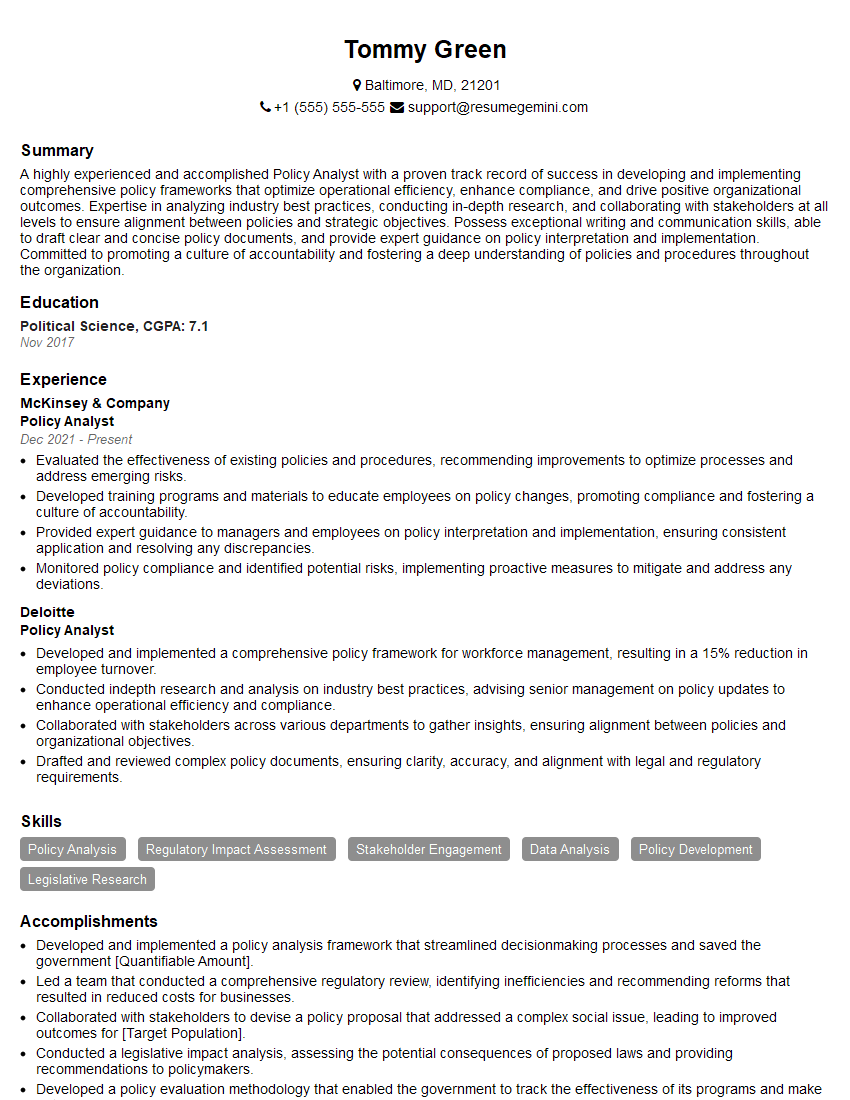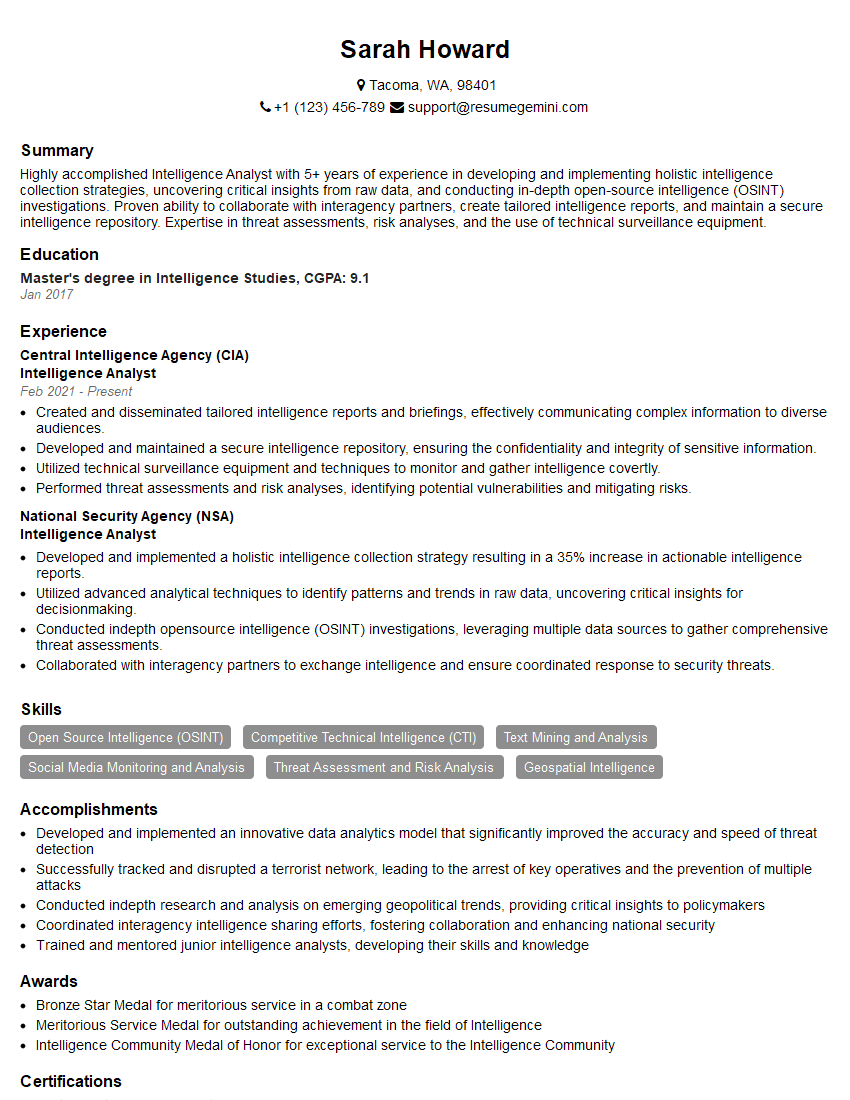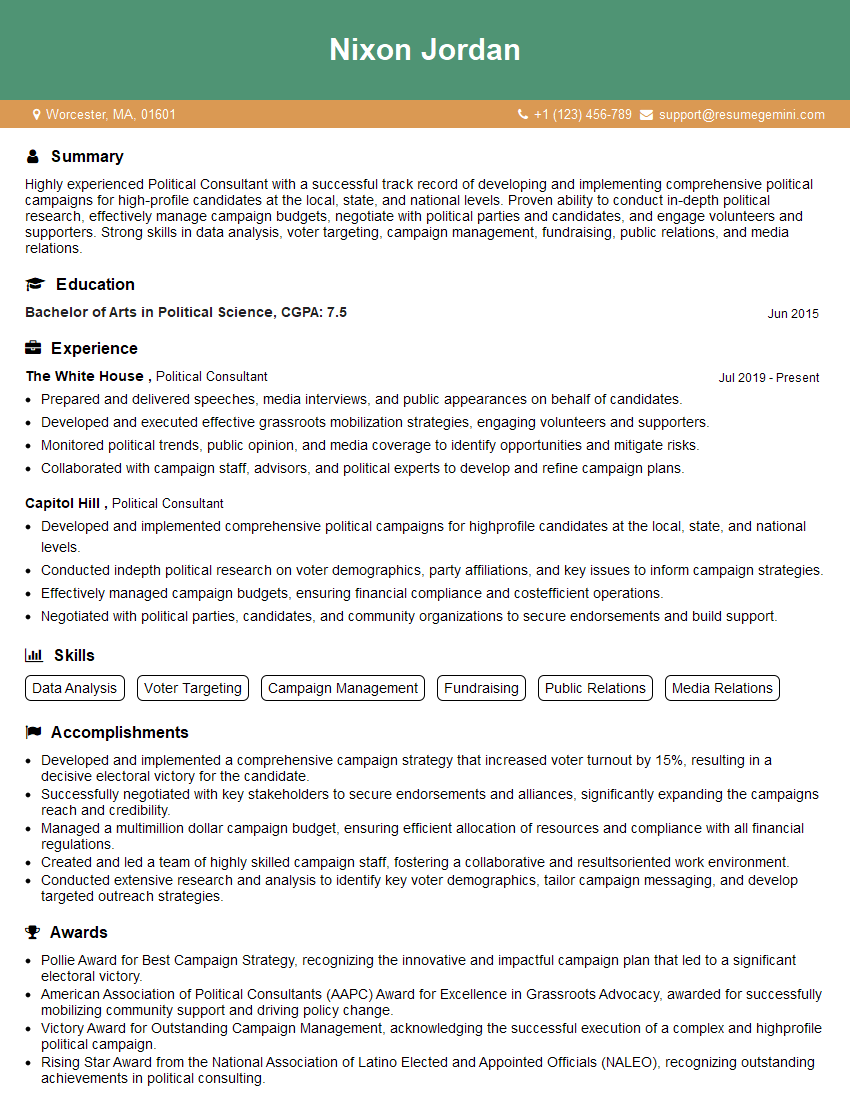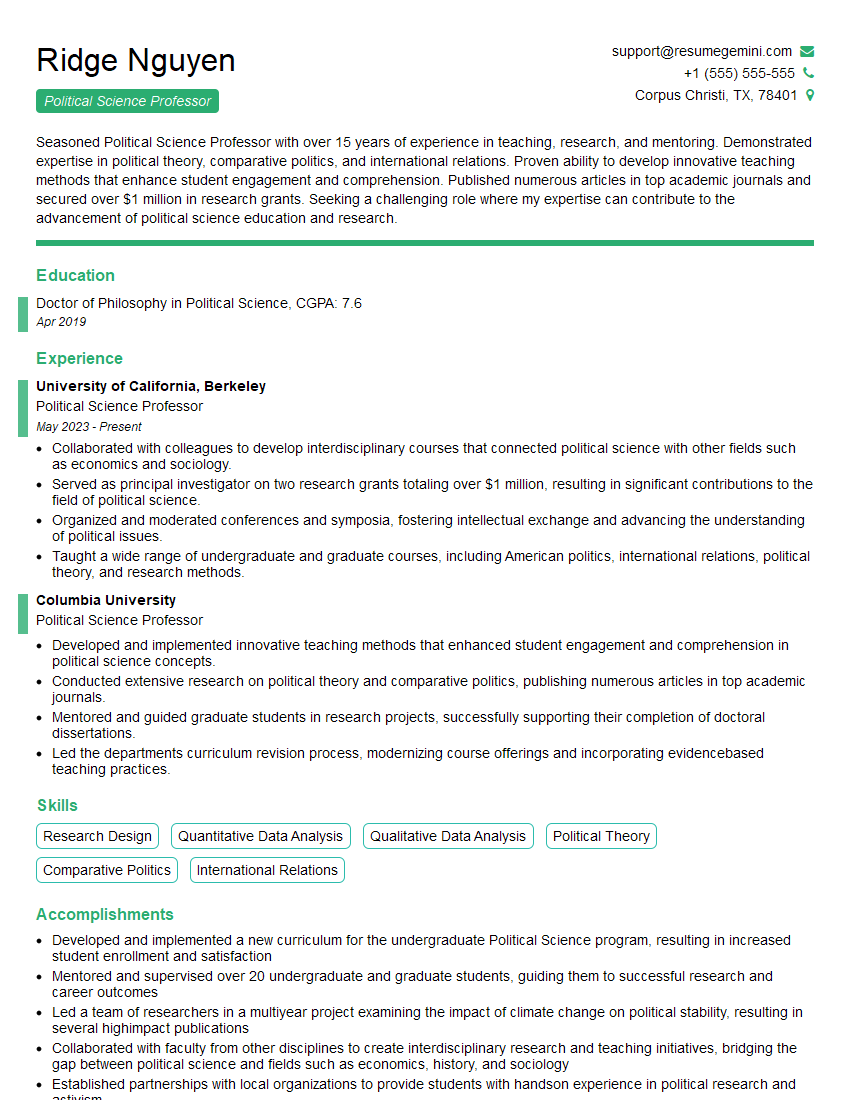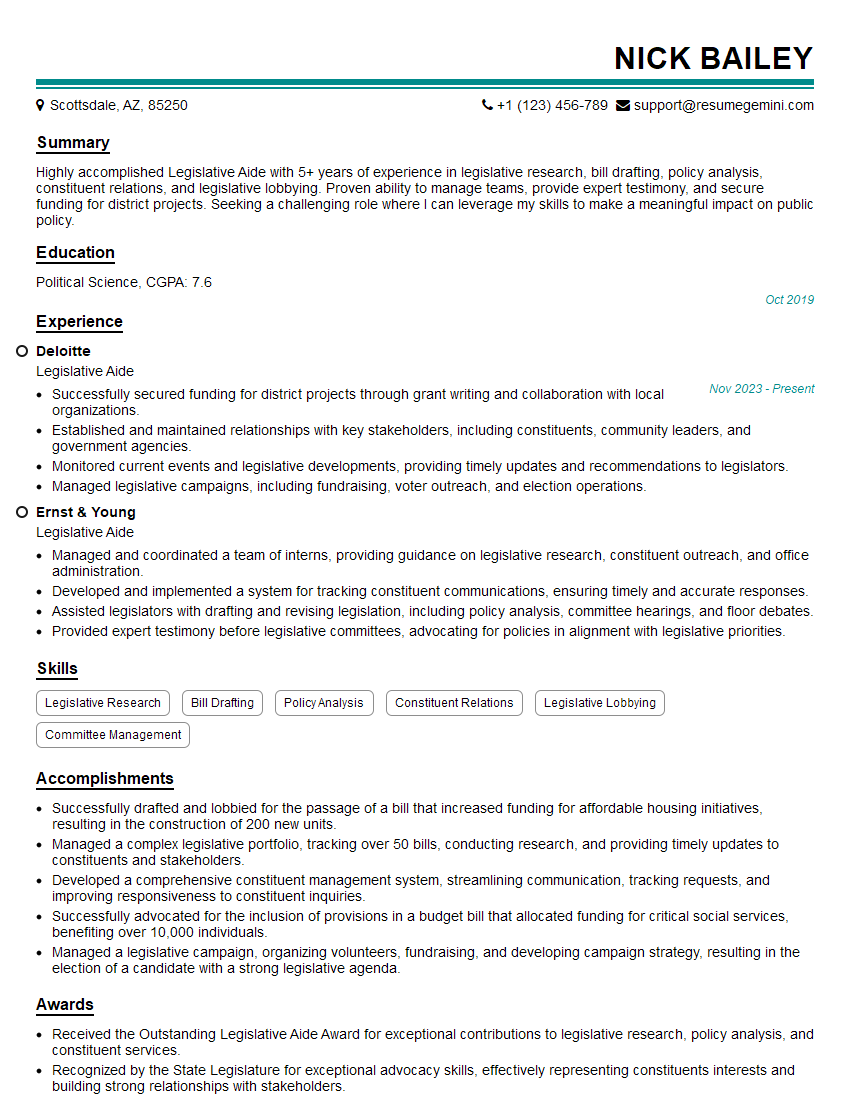Interviews are opportunities to demonstrate your expertise, and this guide is here to help you shine. Explore the essential Political Science Theory interview questions that employers frequently ask, paired with strategies for crafting responses that set you apart from the competition.
Questions Asked in Political Science Theory Interview
Q 1. Explain the difference between liberalism and conservatism.
Liberalism and conservatism represent contrasting approaches to governance and societal organization. Liberalism, at its core, champions individual rights, freedoms, and limited government intervention. It emphasizes equality of opportunity, social justice, and often advocates for progressive social change. Think of the American Civil Rights Movement – a largely liberal-driven push for equality. Conservatism, conversely, prioritizes tradition, social order, and a more cautious approach to change. It often emphasizes individual responsibility, free markets, and a strong national defense. Consider the emphasis on family values and limited government regulation often associated with conservative viewpoints. The differences are not always stark, however; variations exist within both ideologies, creating centrist positions and diverse interpretations.
For example, while both may support free markets, a liberal might advocate for stronger social safety nets to mitigate inequality, while a conservative might focus on tax cuts to stimulate economic growth with less government involvement.
Q 2. Define and compare different theories of power (e.g., Gramsci, Foucault).
Several theories illuminate the complexities of power. Antonio Gramsci’s concept of hegemony describes how the dominant class maintains power not just through force, but also through ideological control – shaping beliefs and values to make their rule seem natural and legitimate. Think of how dominant narratives surrounding economic systems or national identity can influence perceptions of power. Michel Foucault, conversely, analyzed power as decentralized and pervasive, operating through disciplinary mechanisms embedded within societal institutions. This approach highlights how power shapes our behavior and thoughts subtly through surveillance, norms, and self-regulation, rather than simply top-down control. Imagine the impact of societal norms and expectations on individuals’ choices and behaviors.
The difference lies in the locus of power: Gramsci focuses on the dominant class’s ideological control, while Foucault emphasizes the dispersed and disciplinary nature of power woven into society’s fabric. Both, however, highlight the subtle ways power operates beyond overt coercion.
Q 3. Discuss the strengths and weaknesses of rational choice theory.
Rational choice theory posits that individuals make decisions by weighing costs and benefits to maximize their self-interest. It’s a powerful tool for analyzing political behavior, predicting voting patterns, or understanding strategic interactions between nations. For example, a voter might choose a candidate based on perceived benefits like tax cuts or improved healthcare.
Strengths include its parsimonious nature – its simple assumptions allow for broad application. Its predictive power can be quite strong in certain situations, particularly those with clearly defined preferences and choices. However, weaknesses are equally significant. It often oversimplifies human behavior by ignoring emotions, altruism, and social norms, which heavily influence decisions. It also struggles to explain seemingly irrational behavior, like voting against one’s perceived self-interest. Further, it assumes perfect information, which is rarely the case in complex political realities. Therefore, while offering a valuable framework, it’s crucial to acknowledge its limitations and consider its application cautiously.
Q 4. Analyze the impact of globalization on national sovereignty.
Globalization, characterized by increased interconnectedness through trade, communication, and migration, has profoundly impacted national sovereignty. The rise of multinational corporations, international organizations like the World Trade Organization, and the flow of capital across borders have arguably diminished the exclusive control states have over their economies and policies.
For instance, decisions made by international bodies can directly affect national economic policy, impacting domestic industries and employment. Furthermore, the ease of cross-border communication and information sharing presents challenges to national security and the control of information. However, globalization hasn’t entirely erased national sovereignty. States retain significant power in areas like law enforcement, military affairs, and the regulation of their domestic markets. The relationship is complex, presenting both challenges and opportunities for nation-states to navigate within the increasingly globalized world.
Q 5. How does social contract theory influence contemporary political thought?
Social contract theory, originating with thinkers like Hobbes, Locke, and Rousseau, profoundly influences contemporary political thought by framing the relationship between the governed and the government. The core idea is that individuals surrender certain rights to a governing authority in exchange for protection and order. This implicitly legitimizes the state’s authority and shapes our understanding of citizenship and rights.
Today, debates surrounding taxation, social welfare programs, and individual liberties are often rooted in social contract principles. For example, discussions on the balance between individual freedoms and collective security reflect a modern interpretation of the social contract. The question of what rights individuals must surrender and what protections they should receive remain central questions in contemporary political discourse.
Q 6. Explain the concept of political legitimacy.
Political legitimacy refers to the extent to which a government’s rule is considered right and justifiable by its citizens. It’s not merely about possessing power, but about possessing it in a way that is accepted as morally and legally acceptable. Legitimacy can stem from various sources: traditional legitimacy, based on established customs and historical precedents; charismatic legitimacy, based on the exceptional qualities of a leader; and rational-legal legitimacy, based on established laws and procedures. For example, a long-standing monarchy might possess traditional legitimacy, while a democratically elected government derives its legitimacy from the consent of the governed.
A government lacking legitimacy faces challenges in maintaining order, enforcing laws, and gaining cooperation from its citizens. Conversely, legitimacy empowers governments to govern effectively and fosters social stability.
Q 7. Compare and contrast different models of democracy.
Different models of democracy vary in their mechanisms for representation and decision-making. Direct democracy, where citizens directly participate in decision-making, is feasible only in small communities. Representative democracy, the most prevalent form, involves electing representatives to make decisions on behalf of citizens. This can further be categorized: parliamentary systems, where the executive branch is drawn from the legislature, and presidential systems, where the executive and legislative branches are separate but can often check and balance each other.
Beyond these, we can consider variations like consociational democracies, designed to manage ethnic or religious divisions; and deliberative democracies, emphasizing public deliberation and reasoned debate in policymaking. Each model has its strengths and weaknesses; representative democracies offer greater efficiency in large populations, while direct democracies ensure more direct citizen involvement; however, direct democracies can be difficult to manage logistically in larger societies.
Q 8. Discuss the role of political ideology in shaping public policy.
Political ideology acts as a roadmap, guiding the formulation and implementation of public policy. It provides a framework of beliefs about how society should be organized and the role of government, influencing the choices policymakers make regarding issues such as healthcare, education, and the economy. For example, a socialist ideology would likely favor extensive government intervention in the economy to promote social welfare and reduce inequality, leading to policies like universal healthcare and robust social safety nets. Conversely, a libertarian ideology would advocate for limited government intervention, emphasizing individual liberty and free markets, resulting in policies favoring deregulation and lower taxes. The dominant ideology within a governing party or coalition significantly shapes the policy agenda and the legislative process.
Consider the debate surrounding climate change. A nation embracing a strong environmentalist ideology might enact policies like carbon taxes and invest heavily in renewable energy, whereas a nation prioritizing economic growth above environmental concerns might prioritize fossil fuel industries and resist climate action.
Q 9. Analyze the influence of interest groups on policy-making.
Interest groups wield considerable influence on policy-making by advocating for specific policies that benefit their members. They achieve this through various means, including lobbying, campaign contributions, grassroots mobilization, and public awareness campaigns. For instance, the National Rifle Association (NRA) in the United States has historically been very effective at influencing gun control legislation, while environmental groups like the Sierra Club exert pressure on policymakers to address climate change. The effectiveness of an interest group hinges on factors such as its resources, organizational strength, access to decision-makers, and the public perception of its cause.
The influence of interest groups can be both positive and negative. While they represent the interests of specific segments of society and can enhance citizen participation in the political process, they can also lead to policy distortions, particularly when powerful groups prioritize their narrow interests over the broader public good. This underscores the importance of regulatory frameworks to ensure transparency and accountability in lobbying activities.
Q 10. Explain the concept of political socialization.
Political socialization is the lifelong process through which individuals acquire their political beliefs, values, and attitudes. It’s like learning a language – a gradual process shaped by multiple influences. These influences include family, education, peers, media, and significant life events. For example, children often adopt the political views of their parents. Education systems play a crucial role in instilling civic values and knowledge of political institutions. Media, both traditional and social, shapes public opinion through its framing of political issues and its presentation of political actors. A major historical event, like a war or economic crisis, can profoundly reshape political attitudes.
Understanding political socialization is crucial for comprehending shifts in public opinion and predicting electoral outcomes. Analyzing the socialization process allows for a better understanding of the factors that contribute to political stability or instability within a society.
Q 11. Discuss different approaches to studying political behavior.
Political behavior can be studied through various approaches, each with its own strengths and weaknesses.
- Behavioralism: This approach focuses on observable actions and emphasizes quantifiable data, often employing statistical methods to analyze voting patterns, survey data, and public opinion.
- Rational Choice Theory: This perspective assumes individuals act rationally to maximize their self-interest, and their choices are influenced by cost-benefit analysis. It’s used to explain voting decisions and the formation of political coalitions.
- Institutionalism: This approach centers on the role of formal and informal institutions in shaping political outcomes. It explores how rules, norms, and procedures affect political actors and decisions.
- Post-behavioral Approach: This perspective acknowledges the limitations of strictly objective observation and recognizes the subjective nature of political research. It seeks to combine the rigor of behavioralism with the consideration of values and ethical considerations.
Each of these approaches provides valuable insights into political behavior, but a comprehensive understanding often requires drawing on multiple perspectives.
Q 12. What are the key features of federalism and its challenges?
Federalism is a system of government where power is divided between a central (national) government and regional (state or provincial) governments. This division of powers aims to balance efficiency and responsiveness at the national level with local autonomy and self-determination. Key features include a written constitution outlining the powers of each level of government, mechanisms for resolving disputes between levels, and a system of checks and balances preventing any one level from becoming too dominant.
However, federal systems face challenges. These include disputes over the allocation of resources and responsibilities, tensions between national unity and regional diversity, and the potential for gridlock when different levels of government have conflicting priorities. The United States, with its complex relationship between federal and state governments, provides a case study demonstrating both the strengths and challenges inherent in federalism. For example, the ongoing debate over healthcare policy highlights the tension between federal initiatives and state-level autonomy.
Q 13. Explain the concept of political culture and its impact.
Political culture encompasses the shared beliefs, values, attitudes, and norms that shape a society’s political behavior and institutions. It’s the collective mindset regarding politics, encompassing perceptions of authority, legitimacy, participation, and the proper role of government. For example, a political culture characterized by strong civic engagement would likely result in higher voter turnout and greater involvement in community affairs. In contrast, a culture with low levels of political trust might lead to cynicism and disengagement from political processes. Political culture influences everything from the stability of democratic institutions to the effectiveness of government policies.
Understanding a nation’s political culture provides critical context for interpreting its political events and making policy recommendations. For example, policies promoting transparency and citizen participation might be more effective in societies with a strong culture of civic engagement than in those where such values are less prominent.
Q 14. Discuss the role of institutions in shaping political outcomes.
Political institutions, including legislatures, executives, judiciaries, and bureaucracies, play a fundamental role in shaping political outcomes. They provide the framework within which political actors operate, defining rules, procedures, and decision-making processes. The design and effectiveness of these institutions greatly influence the degree of political stability, the responsiveness of government to citizen demands, and the distribution of power within society.
For example, a strong, independent judiciary can safeguard individual rights and constrain the power of the executive branch. A robust legislature, capable of effective oversight of the executive, promotes accountability and transparency. The structure and function of bureaucracies significantly affect policy implementation. Understanding the role of institutions is essential for analyzing political change, evaluating the effectiveness of governance, and designing institutional reforms.
Q 15. How do political parties influence electoral systems?
Political parties are crucial actors in shaping electoral systems. They don’t just *participate* in elections; they actively structure the electoral landscape. Their influence manifests in several ways:
- Candidate Selection: Parties nominate candidates, often through internal processes, which determines who voters can choose from. This can limit the range of political voices and perspectives represented. For instance, a dominant party might strategically select candidates who reinforce their existing power base.
- Campaigning and Resource Mobilization: Parties provide crucial resources for campaigns – funding, volunteers, media strategies – giving their candidates a significant advantage over independent candidates. This disparity in resources can heavily influence electoral outcomes.
- Voter Mobilization: Parties actively engage in getting out the vote (GOTV) efforts, encouraging their supporters to register and cast ballots. Their organizational strength can significantly boost voter turnout, particularly among specific demographics.
- Agenda Setting: Parties shape the political agenda by highlighting certain issues and framing them in ways that resonate with voters. This can influence which policies get debated and prioritized during election campaigns.
- Electoral System Design: Although not always directly, parties influence the design of electoral systems themselves through lobbying and political pressure. For example, parties may advocate for proportional representation or winner-take-all systems depending on their strategic advantages.
Consider the impact of strong party systems, like those in many European countries, versus weaker systems, common in the United States. The stronger the party, the more they shape the entire electoral process.
Career Expert Tips:
- Ace those interviews! Prepare effectively by reviewing the Top 50 Most Common Interview Questions on ResumeGemini.
- Navigate your job search with confidence! Explore a wide range of Career Tips on ResumeGemini. Learn about common challenges and recommendations to overcome them.
- Craft the perfect resume! Master the Art of Resume Writing with ResumeGemini’s guide. Showcase your unique qualifications and achievements effectively.
- Don’t miss out on holiday savings! Build your dream resume with ResumeGemini’s ATS optimized templates.
Q 16. Analyze the relationship between political economy and development.
Political economy examines the interplay between political institutions and economic systems. It’s a crucial lens for understanding development because economic growth and societal well-being aren’t solely determined by market forces; they’re deeply intertwined with political decisions, policies, and institutions.
- Property Rights and Contract Enforcement: A stable political system with strong institutions that protect property rights and enforce contracts creates a more predictable and attractive environment for investment and economic growth. Lack of these can stifle development.
- Macroeconomic Policy: Fiscal and monetary policies, determined by political actors, significantly impact economic growth and stability. Sound policies promote development, while flawed ones can lead to inflation, recession, and inequality.
- Regulation and Deregulation: Government regulation, shaped by political interests, influences market dynamics. Appropriate regulation can prevent market failures and protect consumers, while excessive or inefficient regulation can hinder growth.
- Distribution of Resources and Wealth: Political decisions on taxation, social welfare, and infrastructure projects directly affect how resources and wealth are distributed within society. This distribution impacts both economic growth and social equality.
- Governance and Corruption: Political corruption diverts resources away from productive investments and undermines public trust, hindering development. Strong, transparent governance is vital for sustainable development.
Think about post-colonial nations: Many struggled with development due to weak institutions, political instability, and corruption, highlighting the crucial link between political stability and economic progress. Successful developmental states, like South Korea or Singapore, invested heavily in building strong institutions and fostering a stable political environment conducive to economic growth.
Q 17. Explain the concept of political violence and its causes.
Political violence encompasses any form of violence perpetrated for political purposes, ranging from terrorism and armed conflict to riots and assassinations. Its causes are complex and multifaceted, often intertwining various factors:
- Grievances: Real or perceived injustices, such as discrimination, political exclusion, economic inequality, or human rights abuses, can fuel grievances that lead to violence. Think about the Arab Spring uprisings, driven partly by economic inequality and lack of political participation.
- Resource Scarcity: Competition over scarce resources like land, water, or oil can trigger violent conflict, particularly in regions with weak governance.
- Political Instability: Weak or failing states with ineffective governance, lack of the rule of law, and a history of political violence are more prone to further outbreaks. The ongoing conflict in many parts of Africa underscores this dynamic.
- Ideology and Political Beliefs: Extremist ideologies that justify violence to achieve political goals contribute to political violence. Examples range from religious extremism to nationalist movements.
- Opportunity and Capacity: The availability of weapons, the presence of armed groups, and the absence of strong security forces can create opportunities for violence. The proliferation of weapons makes conflict more likely.
Understanding the causes is crucial for conflict prevention and resolution. Addressing grievances, promoting good governance, and building strong institutions are vital steps in reducing the likelihood of political violence.
Q 18. Discuss the challenges of measuring political participation.
Measuring political participation presents several challenges due to its multifaceted nature and the difficulty of capturing nuances in citizens’ engagement. Here are some key challenges:
- Defining Participation: The very definition of political participation is contested. It ranges from voting and campaigning to protesting, contacting officials, and even simply following politics. What constitutes “meaningful” participation?
- Data Collection: Reliable data is difficult to obtain, especially on less conventional forms of participation. Surveys may miss informal activities; official records often lack detail or accuracy.
- Measurement Bias: Surveys can be susceptible to biases, for example, overrepresenting certain demographics or types of participation. Also, self-reported data might be unreliable.
- Cross-national Comparison: Comparing levels of participation across different countries is difficult due to variations in electoral systems, political cultures, and the very definition of political participation.
- Unconventional Participation: Measuring unconventional forms of participation like protests or boycotts is more challenging due to their decentralized nature and difficulties in accurately quantifying their impact.
Researchers employ a variety of methods to address these challenges, including mixed-methods approaches combining quantitative (e.g., survey data) and qualitative (e.g., interviews, case studies) methods. Careful attention to these limitations is essential for accurate interpretation of findings on political participation.
Q 19. What is the significance of game theory in political science?
Game theory provides a powerful framework for analyzing strategic interactions in politics. It helps model how actors with diverse interests and goals make decisions, anticipating the actions of others. Its significance lies in its ability to:
- Model Strategic Decision-Making: Game theory allows political scientists to model scenarios like legislative bargaining, international relations, and election campaigns as games, where actors choose strategies to maximize their payoffs (outcomes). The Prisoner’s Dilemma is a classic example showcasing this.
- Predict Outcomes: By analyzing game structures (like cooperative or non-cooperative games), we can predict the likely outcomes of political interactions, anticipating potential alliances, conflicts, or compromises.
- Understand Cooperation and Conflict: Game theory clarifies conditions that facilitate or hinder cooperation among actors, highlighting the role of factors like information, trust, and enforcement mechanisms. Understanding how these dynamics affect negotiations (e.g., arms control treaties) is invaluable.
- Analyze Institutions: Game theory helps to evaluate the effectiveness of political institutions in shaping strategic interactions. How do institutional rules, like veto power or voting procedures, influence outcomes?
- Develop Strategies: It can inform the development of effective strategies for political actors, helping them anticipate the actions of opponents and choose optimal courses of action.
Game theory doesn’t offer perfect predictions, but it provides a structured way to understand complex political dynamics. It’s a powerful tool for simulating real-world interactions and developing insights into political behavior.
Q 20. Explain the role of the media in shaping political discourse.
The media plays a powerful role in shaping political discourse by influencing public opinion, setting the political agenda, and framing political issues. Its influence is multifaceted:
- Agenda-Setting: The media determines which issues receive public attention. By focusing on specific events or topics, the media sets the agenda for political debate, influencing what citizens consider important.
- Framing: The media doesn’t just report facts; it frames them within a narrative or context. This framing can significantly impact how audiences perceive political events and actors. Different media outlets might frame the same event differently, shaping public opinion accordingly.
- Priming: By repeatedly highlighting certain aspects of political issues, the media can prime audiences to evaluate political leaders or policies based on those specific criteria. Constant media coverage of a specific political scandal might prime voters to judge a candidate’s character rather than their policies.
- Persuasion: Through opinion pieces, editorials, and biased reporting, the media can attempt to persuade audiences to adopt particular viewpoints or support specific candidates or policies.
- Information Dissemination: The media acts as a crucial channel for disseminating information about politics to the public, enabling citizens to be informed about political events and candidates.
The rise of social media adds further complexity. Its decentralized nature and rapid spread of information have both broadened and fragmented political discourse, leading to challenges like the spread of misinformation and echo chambers.
Q 21. Discuss the impact of social movements on political change.
Social movements are organized collective actions aimed at promoting or resisting social and political change. Their impact on political change is significant and multifaceted:
- Raising Awareness and Mobilizing Public Opinion: Social movements draw attention to social issues and mobilize public opinion, creating pressure for political change. The Civil Rights Movement in the US is a prime example of successfully raising awareness and pressuring policymakers.
- Influencing Policy: Through protests, lobbying, and civil disobedience, social movements can directly influence policy decisions, forcing governments to address their demands. The environmental movement has successfully influenced environmental legislation worldwide.
- Shifting Political Discourse: Social movements can alter the terms of political debate by introducing new ideas and challenging dominant narratives. The feminist movement reshaped political discourse around gender equality.
- Promoting Institutional Change: Some movements aim to reform existing institutions or create new ones to better address their concerns. The disability rights movement has achieved significant institutional changes through advocacy and activism.
- Empowering Marginalized Groups: Social movements empower marginalized groups by providing a platform for collective action and strengthening their political voice. The LGBTQ+ rights movement exemplifies this empowerment.
However, social movements face challenges, including repression, internal divisions, and difficulty sustaining momentum. Success depends on factors like organization, resources, public support, and political opportunities.
Q 22. Analyze the concept of political representation.
Political representation is the activity of making citizens’ voices, opinions, and perspectives heard within the decision-making processes of the government. It’s the mechanism through which the governed influence those who govern. This isn’t simply about voting; it encompasses a broader spectrum of actions and interactions. Think of it as a bridge connecting the people to their leaders.
There are various models of representation. Delegate representation sees representatives as directly reflecting the will of their constituents, acting as mere messengers. Trustee representation posits that representatives should use their own judgment, even if it differs from their constituents’ immediate desires, believing they possess the broader expertise to make informed decisions. Mandate representation emphasizes the mandate given by voters based on a party’s platform, and Resemblance representation focuses on the demographic makeup of the representative body mirroring the population it serves.
For instance, a delegate representative might always vote according to the majority opinion in their district on a particular bill, regardless of their personal views. A trustee representative, however, might prioritize a long-term national interest even if it goes against the short-term preferences of their constituents. The ideal model is often debated, with many systems blending elements of each.
Q 23. How do political scientists use quantitative and qualitative methods?
Political scientists utilize both quantitative and qualitative methods to study the political world, often complementing each other. Quantitative methods focus on numerical data and statistical analysis to identify patterns and relationships. Qualitative methods, conversely, prioritize in-depth understanding of complex phenomena through interviews, case studies, and textual analysis.
Quantitative methods might involve analyzing election results to determine voting patterns based on demographics, using statistical software to test hypotheses about the impact of economic conditions on voting behavior, or employing surveys with large sample sizes to understand public opinion on specific policies. Think of analyzing election data to see if there’s a correlation between economic growth and a particular party’s electoral success.
Qualitative methods could involve conducting in-depth interviews with politicians to understand their decision-making processes, analyzing speeches to uncover underlying ideologies, or conducting case studies of specific political events to understand the contributing factors. For example, a researcher might interview activists to understand their motivations and strategies in a social movement.
Often, mixed-methods approaches are employed, combining both quantitative and qualitative data to gain a more comprehensive understanding of a political phenomenon. For instance, a researcher might analyze voting data (quantitative) and then conduct interviews with voters to gain deeper insights into their choices (qualitative).
Q 24. Explain the concept of the state and its characteristics.
The state is a complex concept, but essentially it refers to a political entity with a defined territory, a permanent population, a government capable of exercising control over its territory and people, and the capacity to enter into relations with other states. It’s the primary actor in international relations and the main instrument for regulating and managing society within its borders.
- Territory: A defined geographical area over which the state claims sovereignty.
- Population: A permanent body of people residing within the territory.
- Government: An organized system of political authority with the power to make and enforce laws.
- Sovereignty: Supreme authority within its territory, free from external interference.
- Legitimacy: The belief by the population that the state has the right to rule.
Think of a country like the United States or France. Each has a defined territory, a permanent population, a government that makes and enforces laws, and is recognized internationally as having sovereignty. The strength of a state depends on its ability to effectively govern and maintain control within its borders, and its degree of legitimacy greatly impacts its stability.
Q 25. Discuss the different types of authoritarian regimes.
Authoritarian regimes are characterized by concentrated power, limited political pluralism, and suppression of opposition. However, they vary considerably in their form and methods. Some key types include:
- Totalitarian Regimes: These seek complete control over all aspects of citizens’ lives, including thought and behavior. Examples include Nazi Germany and Stalinist USSR. Propaganda, secret police, and suppression of all dissent are hallmarks.
- Authoritarian Regimes with a Dominant Party: These are characterized by a single ruling party that tolerates little opposition. The party controls the government, and dissent is typically repressed through various means. Examples include China’s Communist Party or the former ruling party of Mexico, the PRI.
- Military Dictatorships: These are ruled by the military or a junta, often seizing power through a coup. Power is concentrated in the hands of military leaders, and civil liberties are often curtailed.
- Personalistic Dictatorships: Power is concentrated in the hands of a single leader who typically relies on patronage networks and cults of personality. Examples include many post-colonial African states under strongmen leaders.
- Theocratic Regimes: Rule is based on religious principles and laws. Religious leaders play a significant role in governing. Examples include Iran.
It’s crucial to note that these categories aren’t mutually exclusive, and many regimes blend aspects of different types. The specific characteristics and methods of repression can also vary significantly depending on the historical context and the specific goals and ideology of the regime.
Q 26. How can political science theories help explain current events?
Political science theories provide essential frameworks for understanding and interpreting current events. They offer tools to analyze complex political phenomena and predict potential outcomes. By applying established theories, we can move beyond mere description of events to a deeper understanding of underlying causes and consequences.
For example, realism in international relations, which emphasizes national interest and power dynamics, can help explain conflicts and alliances between states. The 2022 Russian invasion of Ukraine can be partly analyzed through a realist lens, focusing on Russia’s perceived security threats and its pursuit of strategic goals. Rational choice theory, which assumes actors make decisions to maximize their utility, can be applied to understand voting behavior or the strategic decisions of political actors. Social movement theory can help explain the rise of popular protests and social change movements, such as the Arab Spring uprisings. Democratic peace theory, positing that democracies are less likely to go to war with each other, can be used to analyze the relative peace among established democracies.
It is important to remember that no single theory perfectly explains every event; instead, a multi-faceted approach incorporating relevant theories is usually necessary for a comprehensive understanding.
Q 27. Explain the concept of political efficacy.
Political efficacy refers to the citizens’ belief in their ability to understand and influence political affairs. It encompasses two dimensions: internal efficacy (the belief in one’s own competence to understand and participate in politics) and external efficacy (the belief that the political system is responsive to citizens’ demands).
High political efficacy is associated with greater political participation. Individuals with high internal efficacy are more likely to engage in political activities like voting, contacting elected officials, or participating in protests. High external efficacy fosters trust in the government and a sense that their actions matter. Low political efficacy, conversely, can lead to apathy and disengagement from the political process.
Imagine two citizens: One actively follows the news, understands political issues, and believes their vote matters (high internal and external efficacy). The other is disengaged, feels that their vote doesn’t count, and avoids political participation (low internal and external efficacy). The former is far more likely to be politically active.
Political efficacy is influenced by factors such as education, social networks, media exposure, and past experiences with the political system. Understanding levels of political efficacy is essential for assessing the health of a democracy and for designing effective policies to promote citizen participation.
Q 28. Discuss the challenges of democratization in developing countries.
Democratization in developing countries faces numerous challenges. These challenges often stem from pre-existing conditions and the complex dynamics of the transition process itself.
- Weak state capacity: Many developing countries lack strong, well-functioning state institutions, making it difficult to enforce laws, provide essential services, and ensure fair elections.
- Ethnic and religious divisions: Deep-seated social cleavages can make consensus-building and power-sharing difficult, potentially leading to conflict and undermining democratic stability.
- Economic inequality: Large disparities in wealth can create resentment and instability, making it challenging to establish a level playing field for political participation.
- Lack of civic engagement: A lack of trust in government, limited political knowledge, and low levels of political participation can hinder the development of a vibrant civil society essential for a democracy.
- Military intervention: The military may intervene to overthrow democratically elected governments, undermining the democratic process and leading to authoritarian rule.
- Corruption: Widespread corruption can erode public trust, distort political competition, and undermine the rule of law.
- External interference: Foreign powers may interfere in the domestic affairs of developing countries, supporting or opposing certain political actors, hindering the development of genuine democracy.
Successfully navigating these challenges requires a multifaceted approach involving strengthening state institutions, fostering inclusive political participation, addressing economic inequality, promoting civic education, and creating a supportive international environment. The path to democratization is rarely linear, and setbacks are common. Understanding these challenges is crucial for designing effective strategies to support the transition to and consolidation of democracy in developing countries.
Key Topics to Learn for Your Political Science Theory Interview
Acing your Political Science Theory interview requires a deep understanding of core concepts and their practical applications. This section outlines key areas to focus your preparation.
- Classical Political Philosophy: Explore the works of Plato, Aristotle, Machiavelli, Hobbes, Locke, Rousseau, and their enduring influence on modern political thought. Consider their differing approaches to governance, justice, and the nature of the state.
- Modern Political Theory: Grasp the key tenets of liberalism, conservatism, socialism, feminism, and other major ideologies. Analyze their strengths, weaknesses, and historical impact. Be prepared to discuss contemporary debates within these frameworks.
- Political Behavior: Understand the factors influencing voting behavior, political participation, and public opinion. Explore relevant research methodologies and their implications for policymaking.
- Power and Authority: Analyze different theories of power – including elite theory, pluralist theory, and Marxist theory – and their implications for understanding political systems. Discuss the relationship between power, legitimacy, and authority.
- Comparative Politics: Develop a comparative perspective on political institutions, processes, and behavior across different countries and regions. Consider case studies to illustrate theoretical concepts.
- Methodology and Research Design: Familiarize yourself with qualitative and quantitative research methods used in political science. Be prepared to discuss the strengths and limitations of different approaches to empirical research.
Next Steps: Unlock Your Career Potential
Mastering Political Science Theory opens doors to a diverse range of exciting career paths in academia, government, non-profit organizations, and the private sector. To maximize your job prospects, a strong resume is essential. An ATS-friendly resume, optimized for Applicant Tracking Systems, significantly increases your chances of getting your application noticed.
ResumeGemini is a trusted resource for crafting compelling and effective resumes. We can help you present your skills and experience in the best possible light. We even provide examples of resumes tailored to Political Science Theory careers to help you get started. Take the next step towards your dream job – build a winning resume with ResumeGemini.
Explore more articles
Users Rating of Our Blogs
Share Your Experience
We value your feedback! Please rate our content and share your thoughts (optional).
What Readers Say About Our Blog
This was kind of a unique content I found around the specialized skills. Very helpful questions and good detailed answers.
Very Helpful blog, thank you Interviewgemini team.
